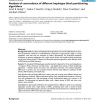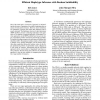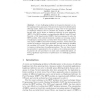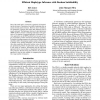100
click to vote
BMCBI
2004
15 years 1 months ago
2004
Background: Increasingly researchers are turning to the use of haplotype analysis as a tool in population studies, the investigation of linkage disequilibrium, and candidate gene ...
100
click to vote
BIOINFORMATICS
2004
15 years 1 months ago
2004
Motivation: The diversity of a haplotype, represented as a string of polymorphic sites along a DNA sequence, increases exponentially with the number of sites if recombinations are...
BMCBI
2005
15 years 1 months ago
2005
Background: Different classes of haplotype block algorithms exist and the ideal dataset to assess their performance would be to comprehensively re-sequence a large genomic region ...
115
click to vote
IJAIT
2008
15 years 2 months ago
2008
One of the main topics of research in genomics is determining the relevance of mutations, described in haplotype data, as causes of some genetic diseases. However, due to technolo...
130
click to vote
BMCBI
2006
15 years 2 months ago
2006
Background: Haplotype analysis has gained increasing attention in the context of association studies of disease genes and drug responsivities over the last years. The potential us...
110
click to vote
CONSTRAINTS
2008
15 years 2 months ago
2008
Abstract. A very challenging problem in the genetics domain is to infer haplotypes from genotypes. This process is expected to identify genes affecting health, disease and response...
105
click to vote
BMCBI
2007
15 years 2 months ago
2007
Background: To look for genetic linkage between angiotensin-I converting enzyme(ACE) gene and hypertension in a Korean adolescent cohort, we developed a powerful test using the co...
110
click to vote
BMCBI
2007
15 years 2 months ago
2007
Background: Maximum parsimony phylogenetic tree reconstruction from genetic variation data is a fundamental problem in computational genetics with many practical applications in p...
111
click to vote
AAAI
2006
15 years 3 months ago
2006
One of the main topics of research in genomics is determining the relevance of mutations, described in haplotype data, as causes of some genetic diseases. However, due to technolo...
115
click to vote
CPM
2004
Springer
15 years 7 months ago
2004
Springer
The perfect phylogeny model for haplotype evolution has been successfully applied to haplotype resolution from genotype data. In this study we explore the application of the perfe...




